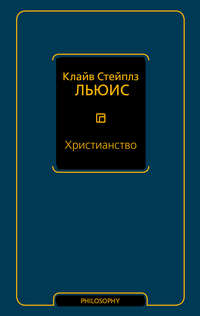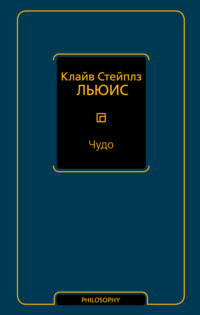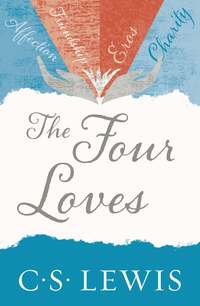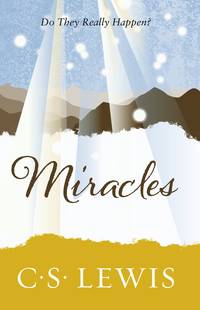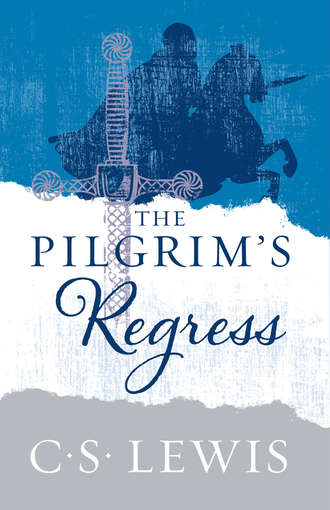
Полная версия
The Pilgrim’s Regress
C. S. LEWIS
CONTENTS
Cover
Title Page
Copyright
Dedication
Map
Preface to the Third Edition
BOOK 1 – THE DATA
1 The Rules
2 The Island
3 The Eastern Mountains
4 Leah for Rachel
5 Ichabod
6 Quem Quaeritis in Sepulchro? Non Est Hic
BOOK 2 – THRILL
1 Dixit Insipiens
2 The Hill
3 A Little Southward
4 Soft Going
5 Leah for Rachel
6 Ichabod
7 Non Est Hic
8 Great Promises
BOOK 3 – THROUGH DARKEST ZEITGEISTHEIM
1 Eschropolis
2 A South Wind
3 Freedom of Thought
4 The Man Behind the Gun
5 Under Arrest
6 Poisoning the Wells
7 Facing the Facts
8 Parrot Disease
9 The Giant Slayer
BOOK 4 – BACK TO THE ROAD
1 Let Grill Be Grill
2 Archetype and Ectype
3 Esse is Percipi
4 Escape
BOOK 5 – THE GRAND CANYON
1 The Grand Canyon
2 Mother Kirk’s Story
3 The Self-Sufficiency of Vertue
4 Mr Sensible
5 Table Talk
6 Drudge
7 The Gaucherie of Vertue
BOOK 6 – NORTHWARD ALONG THE CANYON
1 First Steps to the North
2 Three Pale Men
3 Neo-Angular
4 Humanist
5 Food from the North
6 Furthest North
7 Fool’s Paradise
BOOK 7 – SOUTHWARD ALONG THE CANYON
1 Vertue is Sick
2 John Leading
3 The Main Road Again
4 Going South
5 Tea on the Lawn
6 The House of Wisdom
7 Across the Canyon by Moonlight
8 This Side by Sunlight
9 Wisdom – Exoteric
10 Wisdom – Esoteric
11 Mum’s the Word
12 More Wisdom
BOOK 8 – AT BAY
1 Two Kinds of Monist
2 John Led
3 John Forgets Himself
4 John Finds his Voice
5 Food at a Cost
6 Caught
7 The Hermit
8 History’s Words
9 Matter of Fact
10 Archetype and Ectype
BOOK 9 – ACROSS THE CANYON
1 Across the Canyon by the Inner Light
2 This Side by Lightning
3 This Side by the Darkness
4 Securus Te Projice
5 Across the Canyon
6 Nella Sua Voluntade
BOOK 10 – THE REGRESS
1 The Same Yet Different
2 The Synthetic Man
3 Limbo
4 The Black Hole
5 Superbia
6 Ignorantia
7 Luxuria
8 The Northern Dragon
9 The Southern Dragon
10 The Brook
About the Author
Other Books By
About the Publisher
BOOK I
THE DATA
This every soul seeketh and for the sake of this doth all her actions, having an inkling that it is; but what it is she cannot sufficiently discern, and she knoweth not her way, and concerning this she hath no constant assurance as she hath of other things.
PLATO
Whose souls, albeit in a cloudy memory, yet seek back their good, but, like drunk men, know not the road home.
BOETHIUS
Somewhat it seeketh, and what that is directly it knoweth not, yet very intentive desire thereof doth so incite it, that all other known delights and pleasures are laid aside, they give place to the search of this but only suspected desire.
HOOKER
1
THE RULES
Knowledge of broken law precedes all other religious experiences – John receives his first religious instruction – Did the instructors really mean it?
I dreamed of a boy who was born in the land of Puritania and his name was John. And I dreamed that when John was able to walk he ran out of his parents’ garden on a fine morning on to the road. And on the other side of the road there was a deep wood, but not thick, full of primroses and soft green moss. When John set eyes on this he thought he had never seen anything so beautiful: and he ran across the road and into the wood, and was just about to go down on his hands and knees and to pull up the primroses by handfuls, when his mother came running out of the garden gate, and she also ran across the road, and caught John up, and smacked him soundly and told him he must never go into the wood again. And John cried, but he asked no questions, for he was not yet at the age for asking questions. Then a year went past. And then, another fine morning, John had a little sling and he went out into the garden and he saw a bird sitting on a branch. And John got his sling ready and was going to have a shot at the bird, when the cook came running out of the garden and caught John up and smacked him soundly and told him he must never kill any of the birds in the garden.
‘Why?’ said John.
‘Because the Steward would be very angry,’ said cook.
‘Who is the Steward?’ said John.
‘He is the man who makes rules for all the country round here,’ said cook.
‘Why?’ said John.
‘Because the Landlord set him to do it.’
‘Who is the Landlord?’ said John.
‘He owns all the country,’ said the cook.
‘Why?’ said John.
And when he asked this, the cook went and told his mother. And his mother sat down and talked to John about the Landlord all afternoon: but John took none of it in, for he was not yet at the age for taking it in. Then a year went past, and one dark, cold, wet morning John was made to put on new clothes. They were the ugliest clothes that had ever been put upon him, which John did not mind at all, but they also caught him under the chin, and were tight under the arms, which he minded a great deal, and they made him itch all over. And his father and mother took him out along the road, one holding him by each hand (which was uncomfortable, too, and very unnecessary), and told him they were taking him to see the Steward. The Steward lived in a big dark house of stone on the side of the road. The father and mother went in to talk to the Steward first, and John was left sitting in the hall on a chair so high that his feet did not reach the floor. There were other chairs in the hall where he could have sat in comfort, but his father had told him that the Steward would be very angry if he did not sit absolutely still and be very good: and John was beginning to be afraid, so he sat still in the high chair with his feet dangling, and his clothes itching all over him, and his eyes starting out of his head. After a very long time his parents came back again, looking as if they had been with the doctor, very grave. Then they said that John must go in and see the Steward too. And when John came into the room, there was an old man with a red, round face, who was very kind and full of jokes, so that John quite got over his fears, and they had a good talk about fishing tackle and bicycles. But just when the talk was at its best, the Steward got up and cleared his throat. He then took down a mask from the wall with a long white beard attached to it and suddenly clapped it on his face, so that his appearance was awful. And he said, ‘Now I am going to talk to you about the Landlord. The Landlord owns all the country, and it is very, very kind of him to allow us to live on it at all – very, very kind.’ He went on repeating ‘very kind’ in a queer sing-song voice so long that John would have laughed, but that now he was beginning to be frightened again. The Steward then took down from a peg a big card with small print all over it, and said, ‘Here is a list of all the things the Landlord says you must not do. You’d better look at it.’ So John took the card: but half the rules seemed to forbid things he had never heard of, and the other half forbade things he was doing every day and could not imagine not doing: and the number of the rules was so enormous that he felt he could never remember them all. ‘I hope,’ said the Steward, ‘that you have not already broken any of the rules?’ John’s heart began to thump, and his eyes bulged more and more, and he was at his wit’s end when the Steward took the mask off and looked at John with his real face and said, ‘Better tell a lie, old chap, better tell a lie. Easiest for all concerned,’ and popped the mask on his face all in a flash. John gulped and said quickly, ‘Oh, no, sir.’ ‘That is just as well,’ said the Steward through the mask. ‘Because, you know, if you did break any of them and the Landlord got to know of it, do you know what he’d do to you?’ ‘No, sir,’ said John: and the Steward’s eyes seemed to be twinkling dreadfully through the holes of the mask. ‘He’d take you and shut you up for ever and ever in a black hole full of snakes and scorpions as large as lobsters – for ever and ever. And besides that, he is such a kind, good man, so very, very kind, that I am sure you would never want to displease him.’ ‘No, sir,’ said John. ‘But, please, sir …’ ‘Well,’ said the Steward. ‘Please, sir, supposing I did break one, one little one, just by accident, you know. Could nothing stop the snakes and lobsters?’ ‘Ah!…’ said the Steward; and then he sat down and talked for a long time, but John could not understand a single syllable. However, it all ended with pointing out that the Landlord was quite extraordinarily kind and good to his tenants, and would certainly torture most of them to death the moment he had the slightest pretext. ‘And you can’t blame him,’ said the Steward. ‘For after all, it is his land, and it is so very good of him to let us live here at all – people like us, you know.’ Then the Steward took off the mask and had a nice, sensible chat with John again, and gave him a cake and brought him out to his father and mother. But just as they were going he bent down and whispered in John’s ear, ‘I shouldn’t bother about it all too much if I were you.’ At the same time he slipped the card of the rules into John’s hand and told him he could keep it for his own use.
2
THE ISLAND
He is more serious than the instructors: and discovers the other Law in his members – He awakes to Sweet Desire; and almost at once mixes his own fantasies with it
Now the days and the weeks went on again, and I dreamed that John had little peace either by day or night for thinking of the rules and the black hole full of snakes. At first he tried very hard to keep them all, but when it came to bedtime he always found that he had broken far more than he had kept: and the thought of the horrible tortures to which the good, kind Landlord would put him became such a burden that next day he would become quite reckless and break as many as he possibly could; for oddly enough this eased his mind for the moment. But then after a few days the fear would return and this time it would be worse than before because of the dreadful number of rules that he had broken during the interval. But what puzzled him most at this time was a discovery which he made after the rules had been hanging in his bedroom for two or three nights: namely, that on the other side of the card, on the back, there was quite a different set of rules. There were so many that he never read them all through and he was always finding new ones. Some of them were very like the rules on the front of the card, but most of them were just the opposite. Thus whereas the front of the card said that you must be always examining yourself to see how many rules you had broken, the back of the card began like this:
Rule 1
Put the whole thing out of your head
The moment you get into bed.
Or again, whereas the front said that you must always go and ask your elders what the rule about a certain thing was, if you were in the least doubt, the back said:
Rule 2
Unless they saw you do it,
Keep quiet or else you’ll rue it.
And so on. And now I dreamed that John went out one morning and tried to play in the road and to forget his troubles; but the rules kept coming back into his head so that he did not make much of it. However, he went on always a few yards further till suddenly he looked up and saw that he was so far away from home that he was in a part of the road he had never seen before. Then came the sound of a musical instrument, from behind it seemed, very sweet and very short, as if it were one plucking of a string or one note of a bell, and after it a full, clear voice – and it sounded so high and strange that he thought it was very far away, further than a star. The voice said, Come. Then John saw that there was a stone wall beside the road in that part: but it had (what he had never seen in a garden wall before) a window. There was no glass in the window and no bars; it was just a square hole in the wall. Through it he saw a green wood full of primroses: and he remembered suddenly how he had gone into another wood to pull primroses, as a child, very long ago – so long that even in the moment of remembering the memory seemed still out of reach. While he strained to grasp it, there came to him from beyond the wood a sweetness and a pang so piercing that instantly he forgot his father’s house, and his mother, and the fear of the Landlord, and the burden of the rules. All the furniture of his mind was taken away. A moment later he found that he was sobbing, and the sun had gone in: and what it was that had happened to him he could not quite remember, nor whether it had happened in this wood, or in the other wood when he was a child. It seemed to him that a mist which hung at the far end of the wood had parted for a moment, and through the rift he had seen a calm sea, and in the sea an island, where the smooth turf sloped down unbroken to the bays, and out of the thickets peeped the pale, small-breasted Oreads, wise like gods, unconscious of themselves like beasts, and tall enchanters, bearded to their feet, sat in green chairs among the forests. But even while he pictured these things he knew, with one part of his mind, that they were not like the things he had seen – nay, that what had befallen him was not seeing at all. But he was too young to heed the distinction: and too empty, now that the unbounded sweetness passed away, not to seize greedily whatever it had left behind. He had no inclination yet to go into the wood: and presently he went home, with a sad excitement upon him, repeating to himself a thousand times, ‘I know now what I want’. The first time that he said it, he was aware that it was not entirely true: but before he went to bed he was believing it.
3
THE EASTERN MOUNTAINS
He hears of Death and what his elders pretend to believe about it – An uncomfortable funeral, lacking both Pagan fortitude and Christian hope – Everyone except John cheers up on the way home
John had a disreputable old uncle who was the tenant of a poor little farm beside his father’s. One day when John came in from the garden, he found a great hubbub in the house. His uncle was sitting there with his cheeks the colour of ashes. His mother was crying. His father was sitting very still with a solemn face. And there, in the midst of them, was the Steward with his mask on. John crept round to his mother and asked her what the matter was.
‘Poor Uncle George has had notice to quit,’ she said.
‘Why?’ said John.
‘His lease is up. The Landlord has sent him notice to quit.’
‘But didn’t you know how long the lease was for?’
‘Oh, no, indeed we did not. We thought it was for years and years more. I am sure the Landlord never gave us any idea he was going to turn him out at a moment’s notice like this.’
‘Ah, but it doesn’t need any notice,’ broke in the Steward. ‘You know he always retains the right to turn anyone out whenever he chooses. It is very good of him to let any of us stay here at all.’
‘To be sure, to be sure,’ said the mother.
‘That goes without saying,’ said the father.
‘I’m not complaining,’ said Uncle George. ‘But it seems cruelly hard.’
‘Not at all,’ said the Steward. ‘You’ve only got to go to the Castle and knock at the gate and see the Landlord himself. You know that he’s only turning you out of here to make you much more comfortable somewhere else. Don’t you?’
Uncle George nodded. He did not seem able to get his voice.
Suddenly the father looked at his watch. Then he looked up at the Steward and said:
‘Well?’
‘Yes,’ said the Steward.
Then John was sent up to his bedroom and told to put on the ugly and uncomfortable clothes; and when he came downstairs, itching all over, and tight under the arms, he was given a little mask to put on, and his parents put masks on too. Then I thought in my dream that they wanted to put a mask on Uncle George, but he was trembling so that it would not stay on. So they had to see his face as it was; and his face became so dreadful that everyone looked in a different direction and pretended not to see it. They got Uncle George to his feet with much difficulty, and then they all came out on to the road. The sun was just setting at one end of the road, for the road ran east and west. They turned their backs on the dazzling western sky and there John saw ahead of them the night coming down over the eastern mountains. The country sloped down and eastward to a brook, and all this side of the brook was green and cultivated: on the other side of the brook a great black moor sloped upward, and beyond that were the crags and chasms of the lower mountains, and high above them again the bigger mountains: and on top of the whole waste was one mountain so big and black that John was afraid of it. He was told that the Landlord had his castle up there.
He trudged on eastward, a long time, always descending, till they came to the brook. They were so slow now that the sunset behind them was out of sight. Before them, all was growing darker every minute, and the cold east wind was blowing out of the darkness, right from the mountain tops. When they had stood for a little, Uncle George looked round on them all once or twice, and said, ‘Oh, dear! Oh, dear!’ in a funny small voice like a child’s. Then he stepped over the brook and began to walk away up the moor. It was now so dark and there were so many ups and downs in the moorland that they lost sight of him almost at once. Nobody ever saw him again.
‘Well,’ said the Steward, untying his mask as they turned homeward. ‘We’ve all got to go when our time comes.’
‘That’s true,’ said the father, who was lighting his pipe. When it was lit he turned to the Steward and said: ‘Some of those pigs of George’s have won prizes.’
‘I’d keep ’em if I were you,’ said the Steward. ‘It’s no time for selling now.’
‘Perhaps you’re right,’ said the father.
John walked behind with his mother.
‘Mother.’
‘Well, dear?’
‘Could any of us be turned out without notice like that any day?’
‘Well, yes. But it is very unlikely.’
‘But we might be?’
‘You oughtn’t to be thinking of that sort of thing at your age.’
‘Why oughtn’t I?’
‘It’s not healthy. A boy like you.’
‘Mother.’
‘Yes?’
‘Can we break off the lease without notice too?’
‘How do you mean?’
‘Well, the Landlord can turn us out of the farm whenever he likes. Can we leave the farm whenever we like?’
‘No, certainly not.’
‘Why not?’
‘That’s in the lease. We must go when he likes, and stay as long as he likes.’
‘Why?’
‘I suppose because he makes the leases.’
‘What would happen if we did leave?’
‘He would be very angry.’
‘Would he put us in the black hole?’
‘Perhaps.’
‘Mother.’
‘Well, dear?’
‘Will the Landlord put Uncle George in the black hole?’
‘How dare you say such a thing about your poor uncle? Of course he won’t.’
‘But hasn’t Uncle George broken all the rules?’
‘Broken all the rules? Your Uncle George was a very good man.’
‘You never told me that before,’ said John.
4
LEAH FOR RACHEL
Greed to recover Desire hides the real offer of its return – John tries to force himself to feel it, but finds (and accepts) Lust instead
Then I turned over in my sleep and began to dream deeper still: and I dreamed that I saw John growing tall and lank till he ceased to be a child and became a boy. The chief pleasure of his life in these days was to go down the road and look through the window in the wall in the hope of seeing the beautiful Island. Some days he saw it well enough, especially at first, and heard the music and the voice. At first he would not look through the window into the wood unless he had heard the music. But after a time both the sight of the Island, and the sounds, became very rare. He would stand looking through the window for hours, and seeing the wood, but no sea or Island beyond it, and straining his ears but hearing nothing except the wind in the leaves. And the yearning for that sight of the Island and the sweet wind blowing over the water from it, though indeed these themselves had given him only yearning, became so terrible that John thought he would die if he did not have them again soon. He even said to himself, ‘I would break every rule on the card for them if I could only get them. I would go down into the black hole for ever if it had a window from which I could see the Island.’ Then it came into his head that perhaps he ought to explore the wood and thus he might find his way down to the sea beyond it: so he determined that the next day, whatever he saw or heard at the window, he would go through and spend the whole day in the wood. When the morning came, it had been raining all night and a south wind had blown the clouds away at sunrise, and all was fresh and shining. As soon as he had had his breakfast John was out on the road. With the wind and the birds, and country carts passing, there were many noises about that morning, so that when John heard a strain of music long before he had reached the wall and the window – a strain like that which he desired, but coming from an unexpected quarter – he could not be absolutely certain that he had not imagined it. It made him stand still in the road for a minute, and in my dream I could hear him thinking – like this: ‘If I go after that sound – away off the road, up yonder – it is all luck whether I shall find anything at all. But if I go on to the window, there I know I shall reach the wood, and there I can have a good hunt for the shore and the Island. In fact, I shall insist on finding it. I am determined to. But if I go a new way I shall not be able to insist: I shall just have to take what comes.’ So he went on to the place he knew and climbed through the window into the wood. Up and down and to and fro among the trees he walked, looking this way and that: but he found no sea and no shore, and indeed no end to the wood in any direction. When it came to the middle of the day he was so hot that he sat down and fanned himself. Often, of late, when the sight of the Island had been withheld, he had felt sad and despairing: but what he felt now was more like anger. ‘I must have it,’ he kept on saying to himself, and then, ‘I must have something.’ Then it occurred to him that at least he had the wood, which he would once have loved, and that he had not given it a thought all morning. Very well, thought John, I will enjoy the wood: I will enjoy it. He set his teeth and wrinkled his forehead and sat still until the sweat rolled off him in an effort to enjoy the wood. But the more he tried the more he felt that there was nothing to enjoy. There was the grass and there were the trees: ‘But what am I to do with them?’ said John. Next it came into his head that he might perhaps get the old feeling – for what, he thought, had the Island ever given him but a feeling? – by imagining. He shut his eyes and set his teeth again and made a picture of the Island in his mind: but he could not keep his attention on the picture because he wanted all the time to watch some other part of his mind to see if the feeling were beginning. But no feeling began: and then, just as he was opening his eyes he heard a voice speaking to him. It was quite close at hand, and very sweet, and not at all like the old voice of the wood. When he looked round he saw what he had never expected, yet he was not surprised. There in the grass beside him sat a laughing brown girl of about his own age, and she had no clothes on.



